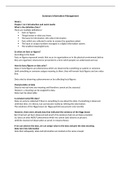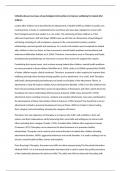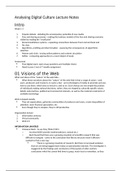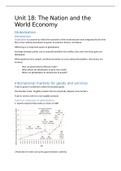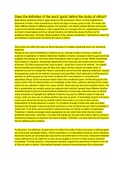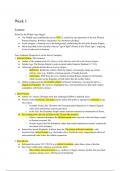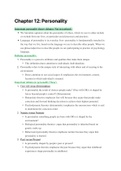International Relations
Week 1
Chapter 1 Approaches to International Relations
Globalization
Globalization is the growing integration of the world in terms of politics, economics, and
culture. Politically, states are confronted with issues like disease, migration, and
environmental degradation that governments cannot manage on their own. Economically,
states’ financial markets are tied together; the internationalization of production makes it
more difficult for states to regulate their own economic policies and causes them to be more
affected by international forces. Culturally, globalization has prompted homogenization –
people enjoying the same music and television shows – and differentiation – the desire to
retain local languages and local autonomy.
Contributions of philosophers to International Relations
,Tools for studying international relations
Key terms
Behavioralism: An approach to the study of social science and international relations
that posits that individuals and units like states act in regularised ways: leads to a
belief that behaviours can be described, explained, and predicted.
Globalization: The process of increasing integration of the world in terms of
economics, politics, communications, social relations, and culture; Increasingly
undermines traditional state sovereignty.
International relations: The study of the interactions among various actors (states,
international organisations, nongovernmental organisations, and subnational entities
like bureaucracies, local governments, and individuals) that participate in
international politics.
Normative: Relating to ethical rules; in foreign policy and international affairs,
standards suggesting what a policy should be.
Chapter 2 The historical context of contemporary international relations
The emerge of the Westphalian system
Most international relations theorists locate the origins of the contemporary state system in
Europe in 1648, the year the Treaties of Westphalia ended the Thirty Years’ War. The Treaties
had three key impacts on the practice of international relations.
The Treaties of Westphalia embraced the notion of sovereignty.
,The Treaties thus introduced the principle of noninterference in the affairs of other states.
Countries in Europe established their own permanent national militaries.
The Treaties established a core group of states that dominated the world until the
beginning of the nineteenth century: Austria, Russia, Prussia, England, France, and
the United Provinces.
Smith beliefs in the ‘Invisible hand of the market’: when individuals pursue their rational
self-interests, the system (the market) operates in a way that benefits everyone.
Europe in the nineteenth century
The nineteenth century in Europe was a turbulent time. The American Revolution (1773-85)
against British rule and the French Revolution (1789) against absolutist rule ushered in the
new century, followed by the Napoleonic Wars and the expansion of imperialism and
colonialism to other continents. The balance of power among the European states that had
stabilized the region during that time began to break down by the end of the century as key
alliances solidified.
Locke attacked absolute power and the notion of the divine right of kings. The crux of
Locke’s argument is that political power ultimately rests with the people, rather than with a
leader or monarch. From revolutions emerge the idea that legitimate rule requires (some)
consent of the governed, and nationalism.
Following the defeat of Napoleon in 1815 (Battle at Waterloo) and the establishment
of peace by the Congress of Vienna, the five powers of Europe, Austria, Britain, France,
Prussia, and Russia, known as the Concert of Europe, ushered in a period of relative peace in
the international political system. All attention was focused on industrialization. Political
changes were dramatic in this time, what explains the absence of major war? Three factors
discouraged war managed by the balance of power.
Europe’s political elites were united in their fear of revolution among the masses.
Because the energies of Germans and Italians were concentrated on forming
contiguous territorial states, and because the precise impact of the newly unified states
on the European balance of power was unknown, a wider war was averted.
Supporting peace in Europe was the complex and crucial phenomenon of
imperialism-colonialism.
The discovery of the “new” world led to rapidly expanding communication between
the Americans and Europe. By the close of the nineteenth century, almost the whole of the
globe was ruled by European states. The process of colonial expansion led to the
, establishment of a European identity. European states enjoyed a solidarity among themselves,
based on their being European, Christian, civilized, and white. European imperialism in Asia
and Africa helps maintain the balance of power. However, this breaks down due to imperial
Germany’s too-rapid growth and the increasing rigidity of alliances, resulting in World War I.
Two camps emerged: the Triple Alliance (Germany, Austria-Hungary, and Italy) and
the Dual Alliance (France and Russia). Britain joined in with Japan, and later also with
France in the Entente Cordiale. The final collapse of the balance-of-power system came with
World War I.
The interwar years and World War II
In the interwar years between World War I and World War II, three empires collapse, Russia
by revolution, the Austro-Hungarian Empire by dismemberment, and the Ottoman Empire by
external wars and internal turmoil. These collapses lead to a resurgence of nationalisms.
German dissatisfaction with the World War I settlement (Treaty of Versailles) leads to
the rise of fascism in Germany. Germany finds allies in Italy and Japan.
A weak League of Nations is unable to respond to Japanese, Italian, and German
aggression. Nor can it prevent to reverse widespread economic depression.
In the view of most Europeans and many in the United States, Germany, and in
particular Hitler, started World War II. But Italy and Japan also played major roles in the
breakdown of interstate order in the 1930s. Hitler first took Czechoslovakia agter agreement
of Britain. Then he divided Poland with Russia, which meant declaration of war from Britain
and France. His plan was to take over Norway, Denmark, the Netherlands, France, and then
the Soviet Union. Operation Barbarossa was the invasion of the Soviet Union, who then
joined sides of Britain and France. The Allies (SU, US, GB, France) fought against the Axis
(Germany, Italy, Japan). World War II was also known for its mass murder of human beings.
Jews in particular, gypsies, communists, LGBTQ individuals, Germans with genetic defects.
Another feature was the use of an atomic bomb from the U.S. on Hiroshima and Nagasaki to
force Japan to surrender.
The Cold War
Two superpowers emerge, the U.S. and the S.U. They are divided by national interests,
ideologies, and mutual misperceptions. These divisions are projected into different
geographic areas.
Week 1
Chapter 1 Approaches to International Relations
Globalization
Globalization is the growing integration of the world in terms of politics, economics, and
culture. Politically, states are confronted with issues like disease, migration, and
environmental degradation that governments cannot manage on their own. Economically,
states’ financial markets are tied together; the internationalization of production makes it
more difficult for states to regulate their own economic policies and causes them to be more
affected by international forces. Culturally, globalization has prompted homogenization –
people enjoying the same music and television shows – and differentiation – the desire to
retain local languages and local autonomy.
Contributions of philosophers to International Relations
,Tools for studying international relations
Key terms
Behavioralism: An approach to the study of social science and international relations
that posits that individuals and units like states act in regularised ways: leads to a
belief that behaviours can be described, explained, and predicted.
Globalization: The process of increasing integration of the world in terms of
economics, politics, communications, social relations, and culture; Increasingly
undermines traditional state sovereignty.
International relations: The study of the interactions among various actors (states,
international organisations, nongovernmental organisations, and subnational entities
like bureaucracies, local governments, and individuals) that participate in
international politics.
Normative: Relating to ethical rules; in foreign policy and international affairs,
standards suggesting what a policy should be.
Chapter 2 The historical context of contemporary international relations
The emerge of the Westphalian system
Most international relations theorists locate the origins of the contemporary state system in
Europe in 1648, the year the Treaties of Westphalia ended the Thirty Years’ War. The Treaties
had three key impacts on the practice of international relations.
The Treaties of Westphalia embraced the notion of sovereignty.
,The Treaties thus introduced the principle of noninterference in the affairs of other states.
Countries in Europe established their own permanent national militaries.
The Treaties established a core group of states that dominated the world until the
beginning of the nineteenth century: Austria, Russia, Prussia, England, France, and
the United Provinces.
Smith beliefs in the ‘Invisible hand of the market’: when individuals pursue their rational
self-interests, the system (the market) operates in a way that benefits everyone.
Europe in the nineteenth century
The nineteenth century in Europe was a turbulent time. The American Revolution (1773-85)
against British rule and the French Revolution (1789) against absolutist rule ushered in the
new century, followed by the Napoleonic Wars and the expansion of imperialism and
colonialism to other continents. The balance of power among the European states that had
stabilized the region during that time began to break down by the end of the century as key
alliances solidified.
Locke attacked absolute power and the notion of the divine right of kings. The crux of
Locke’s argument is that political power ultimately rests with the people, rather than with a
leader or monarch. From revolutions emerge the idea that legitimate rule requires (some)
consent of the governed, and nationalism.
Following the defeat of Napoleon in 1815 (Battle at Waterloo) and the establishment
of peace by the Congress of Vienna, the five powers of Europe, Austria, Britain, France,
Prussia, and Russia, known as the Concert of Europe, ushered in a period of relative peace in
the international political system. All attention was focused on industrialization. Political
changes were dramatic in this time, what explains the absence of major war? Three factors
discouraged war managed by the balance of power.
Europe’s political elites were united in their fear of revolution among the masses.
Because the energies of Germans and Italians were concentrated on forming
contiguous territorial states, and because the precise impact of the newly unified states
on the European balance of power was unknown, a wider war was averted.
Supporting peace in Europe was the complex and crucial phenomenon of
imperialism-colonialism.
The discovery of the “new” world led to rapidly expanding communication between
the Americans and Europe. By the close of the nineteenth century, almost the whole of the
globe was ruled by European states. The process of colonial expansion led to the
, establishment of a European identity. European states enjoyed a solidarity among themselves,
based on their being European, Christian, civilized, and white. European imperialism in Asia
and Africa helps maintain the balance of power. However, this breaks down due to imperial
Germany’s too-rapid growth and the increasing rigidity of alliances, resulting in World War I.
Two camps emerged: the Triple Alliance (Germany, Austria-Hungary, and Italy) and
the Dual Alliance (France and Russia). Britain joined in with Japan, and later also with
France in the Entente Cordiale. The final collapse of the balance-of-power system came with
World War I.
The interwar years and World War II
In the interwar years between World War I and World War II, three empires collapse, Russia
by revolution, the Austro-Hungarian Empire by dismemberment, and the Ottoman Empire by
external wars and internal turmoil. These collapses lead to a resurgence of nationalisms.
German dissatisfaction with the World War I settlement (Treaty of Versailles) leads to
the rise of fascism in Germany. Germany finds allies in Italy and Japan.
A weak League of Nations is unable to respond to Japanese, Italian, and German
aggression. Nor can it prevent to reverse widespread economic depression.
In the view of most Europeans and many in the United States, Germany, and in
particular Hitler, started World War II. But Italy and Japan also played major roles in the
breakdown of interstate order in the 1930s. Hitler first took Czechoslovakia agter agreement
of Britain. Then he divided Poland with Russia, which meant declaration of war from Britain
and France. His plan was to take over Norway, Denmark, the Netherlands, France, and then
the Soviet Union. Operation Barbarossa was the invasion of the Soviet Union, who then
joined sides of Britain and France. The Allies (SU, US, GB, France) fought against the Axis
(Germany, Italy, Japan). World War II was also known for its mass murder of human beings.
Jews in particular, gypsies, communists, LGBTQ individuals, Germans with genetic defects.
Another feature was the use of an atomic bomb from the U.S. on Hiroshima and Nagasaki to
force Japan to surrender.
The Cold War
Two superpowers emerge, the U.S. and the S.U. They are divided by national interests,
ideologies, and mutual misperceptions. These divisions are projected into different
geographic areas.



